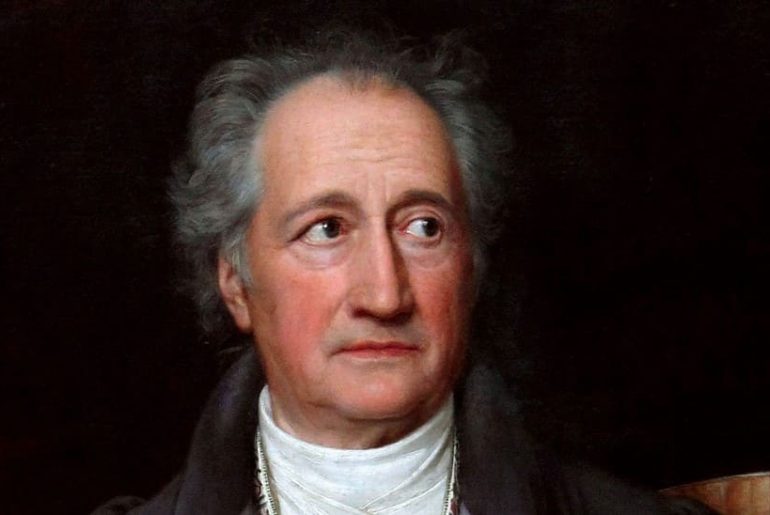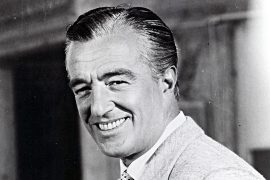Today everyone knows his works. Because Johann Wolfgang von Goethe was a genius: he writes more than almost anyone else and also works as a lawyer, minister and natural scientist. Even during his lifetime, Goethe was idolized for his lines
Johann Wolfgang von Goethe: short profile
Name: Johann Wolfgang von Goethe
Nationality: German
Birthday: August 28, 1749, in Frankfurt am Main
Date of death: March 22, 1832, in Weimar
Well-known works: Götz von Berlichingen (1773), Iphigenie auf Tauris (1779), Torquato Tasso (1790), Faust (1808), Elective Affinities (1809)
Best-known quote: “You can also build something beautiful out of stones that are placed in your way.”
Johann Wolfgang von Goethe was an important poet and naturalist. He is considered one of the most important creators of German-language poetry.
Johann Wolfgang von Goethe: A Biography
Goethe, born on August 28, 1749 in Frankfurt am Main, is the scion of a rich family. Instead of attending a normal school, several tutors teach him Latin, Greek, history and fencing. He hardly has any friends. Because the boy talks precociously; always and everywhere he wants to command.
However, when Goethe moved to Leipzig and later to Strasbourg to study law, it became clear that there was not always much behind the big mouth: the show-off was plagued by a number of fears. Goethe can see no blood, no wound. He has to do something about it!
So Goethe takes part in anatomy courses and forces himself to look when corpses are cut open. Goethe climbs church towers to overcome his fear of heights. And at night he sneaks through cemeteries – until he no longer has to tremble in the dark.
Johann Wolfgang von Goethe is in his mid-20s when he starts writing in earnest. In just a few weeks he wrote “The Sorrows of Young Werther”, his first novel, which consists of letters from a man who was unhappily in love. This book is a sensation! It expresses exactly what young people across Europe think and feel. Werther literally becomes fashionable: many people suddenly dress like the character in the novel, wearing yellow pants, a yellow waistcoat, and a blue overcoat. And all over the country the name Goethe is now known.
Even the only 18-year-old Duke Karl August of Saxe-Weimar-Eisenach took notice of Goethe. He brings the talented poet to court as his advisor! Goethe experienced his wild years in Weimar. He is always on the go with Karl August. They bathe naked in streams and ride through the district at night, sometimes wrapped in sheets: let the simple-minded farmers believe in ghosts!
Goethe’s escape to Italy
Johann Wolfgang von Goethe is now a respected statesman. But he quickly got tired of the annoying official duties in Weimar. With nothing but a garment bag and a satchel full of papers, he fled to Italy in the fall of 1786. There he finally wants to write again.
The light, the landscapes, the sea, the ancient buildings and paintings – all overwhelm the traveler. When Goethe started his journey home to Weimar in April 1788, he had two completed plays with him: “Iphigenie auf Tauris” and “Egmont”.
An unusual selfish
After his return, Goethe meets what is perhaps the most important person in his life: Christiane Vulpius, who years later becomes his wife and the mother of his son August. He also meets Friedrich Schiller, who initially finds his fellow poet terrible. Friedrich Schiller says of Goethe: “I think he is an egotist of an unusual degree.”
But the two soon become inseparable friends. Friedrich Schiller and Goethe give each other all the new works to read. And together they later keep the Weimar Court Theater running. When Schiller dies in 1805, Goethe says he not only loses a companion, but “half of my own existence”.
To distract himself, Goethe throws himself into his work: In the play “Faust I”, the main character – like Goethe himself – is looking for happiness. In order to get it, Faust is even willing to sell his soul to the devil! The play premiered in Braunschweig in 1829. Since then it has been performed thousands of times on Germany’s stages. And no high school student can avoid Goethe’s “Faust” today.
The poet himself never experienced any of this. Johann Wolfgang von Goethe died in Weimar on March 22, 1832 at the age of 82.
Why is Johann Wolfgang von Goethe so famous?
After a disappointed love, he wrote »The Sorrows of Young Werther« in early 1774. This novel soon made him famous throughout Europe. In addition, he dealt with the Fauststoff and created numerous other works.
Who is Johann Wolfgang von Goethe profile?
Goethe, born on August 28, 1749 in Frankfurt am Main, is the scion of a rich family. Instead of attending a normal school, several tutors teach him Latin, Greek, history and fencing. He hardly has any friends.
What kind of person was Johann Wolfgang von Goethe?
Goethe was a richly gifted man and blessed with good fortune throughout his life. He was born in Frankfurt am Main in 1749 and grew up in a wealthy family. His father was an educated man who lived his life according to strict principles without learning a real trade.
What did Johann Wolfgang von Goethe write?
Even today, almost 200 years after his death, his dramas, novels and poems are read all over the world. You probably also know a few of his works, such as the multi-part drama “Faust” (1808/1832) or the famous ballad “Erlkönig” (1782). They are regarded as examples of outstanding German literature.
What is Goethe’s most famous poem?
By far the most famous work by Goethe is without a doubt Faust. Goethe worked on this work for 60 years; he had already written the first parts in 1774.
What is typically Goethe?
GOETHE was talented and lucky all her life. He had influential friends, his works were successful and he was popular with women. Despite his restless lifestyle, which was shaped by a lot of travel, he was lucky enough to have a caring wife and a family in CHRISTIANE VULPIUS.
What was Goethe’s writing style like?
In addition to long poems comprising several hundred verses, there are short two-liners, verses with a high level of linguistic and metaphorical complexity, simple sayings, strict and antique metering, song-like or mocking stanzas, and rhyming poems in free rhythms.
What did Goethe want to achieve?
Life as a student. His father decided that Johann Wolfgang should study law in Leipzig and Strasbourg. The young Goethe actually wanted to study history and classical philology (linguistics) in Göttingen, but bowed to his father’s will.
What is happiness Goethe?
Fortune is the goddess of living people, and to truly feel her favor one must live and see people quite vividly striving and quite sensuously enjoying.
What dramas did Goethe write?
Johann Wolfgang von Goethe is perhaps best known for The Sorrows of Young Werther (1774), the first novel of the Sturm und Drang movement, and for Faust (Part I, 1808; Part II, 1832), a play about a man who sells his soul to the Devil that is sometimes considered Germany’s greatest contribution to world literature.
Was Goethe happy?
Weimar, July 24, 1797: Goethe still had 34 years, seven months and 28 days to live, but he had already made his will. He was said to have a happy constitution during his lifetime and especially after his death.
What does Goethe say about love?
“Learn to grow old with a young heart.”
Why did Goethe say more light?
The simplest interpretation is that Goethe said: “Open the second shutter so that more light can come in!” Others, on the other hand, interpret it in a highly philosophical way.
What did Goethe research?
The Scientist Goethe – Anatomy and Color Theory. Goethe was a universal genius with many talents and an industrious and ambitious researcher: he worked in botany, mineralogy, anatomy and physics. His scientific work brought amazing results to light.





